-
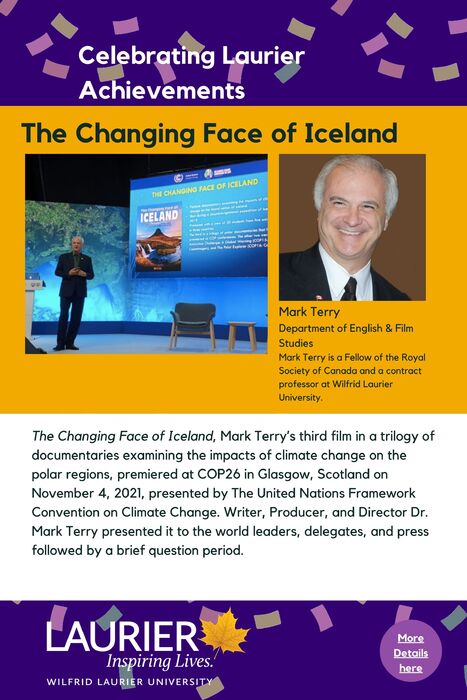 The Changing Face of Iceland
The Changing Face of Iceland The Changing Face of Iceland, Mark Terry’s third film in a trilogy of documentaries examining the impacts of climate change on the polar regions, premiered at COP26 in Glasgow, Scotland on November 4, 2021, presented by The United Nations Framework Convention on Climate Change. Writer, Producer, and Director Dr. Mark Terry presented it to the world leaders, delegates, and press followed by a brief question period.
-
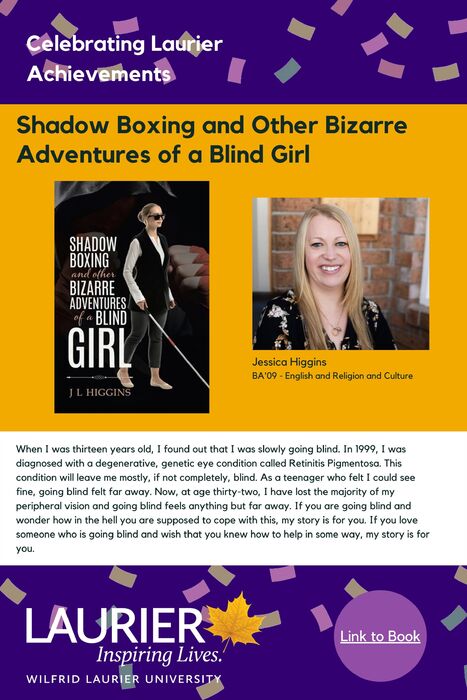 Shadow Boxing and Other Bizarre Adventures of a Blind Girl
Shadow Boxing and Other Bizarre Adventures of a Blind Girl When I was thirteen years old, I found out that I was slowly going blind. In 1999, I was diagnosed with a degenerative, genetic eye condition called Retinitis Pigmentosa. This condition will leave me mostly, if not completely, blind. As a teenager who felt I could see fine, going blind felt far away. Now, at age thirty-two, I have lost the majority of my peripheral vision and going blind feels anything but far away. If you are going blind and wonder how in the hell you are supposed to cope with this, my story is for you. If you love someone who is going blind and wish that you knew how to help in some way, my story is for you.
-
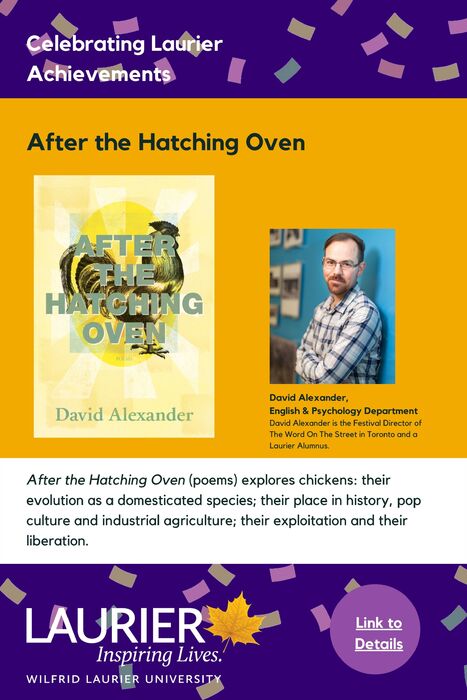 After the Hatching Oven
After the Hatching Oven After the Hatching Oven (poems) explores chickens: their evolution as a domesticated species; their place in history, pop culture and industrial agriculture; their exploitation and their liberation.
-
 Older Sister. Not Necessarily Related
Older Sister. Not Necessarily Related Winner of the 2019 Hilary Weston Writers' Trust Prize for Nonfiction A beautiful and haunting memoir of kinship and culture rediscovered. Jenny Heijun Wills was born in Korea and adopted as an infant into a white family in small-town Canada. In her late twenties, she reconnected with her first family and returned to Seoul where she spent four months getting to know other adoptees, as well as her Korean mother, father, siblings, and extended family. Older Sister. Not Necessarily Related. describes in visceral, lyrical prose the painful ripple effects that follow a child's removal from a family, and the rewards that can flow from both struggle and forgiveness.
-
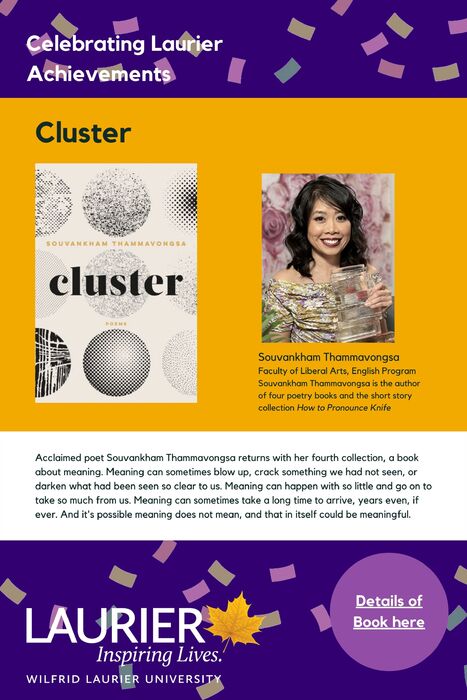 Cluster
Cluster Acclaimed poet Souvankham Thammavongsa returns with her fourth collection, a book about meaning. Meaning can sometimes blow up, crack something we had not seen, or darken what had been seen so clear to us. Meaning can happen with so little and go on to take so much from us. Meaning can sometimes take a long time to arrive, years even, if ever. And it's possible meaning does not mean, and that in itself could be meaningful.
-
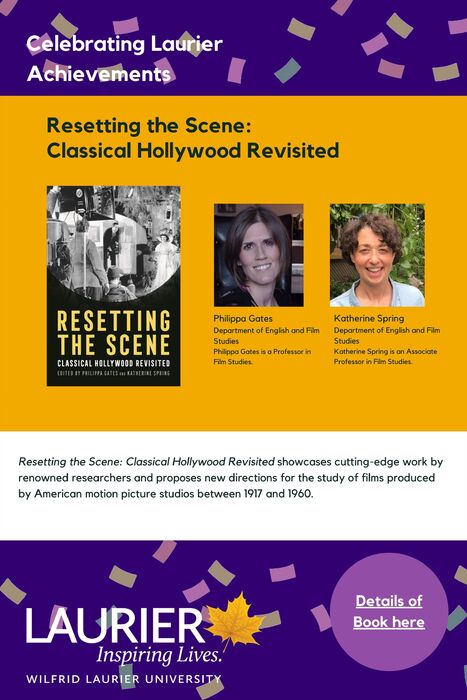 Resetting the Scene: Classical Hollywood Revisited
Resetting the Scene: Classical Hollywood Revisited Resetting the Scene: Classical Hollywood Revisited showcases cutting-edge work by renowned researchers and proposes new directions for the study of films produced by American motion picture studios between 1917 and 1960.
-
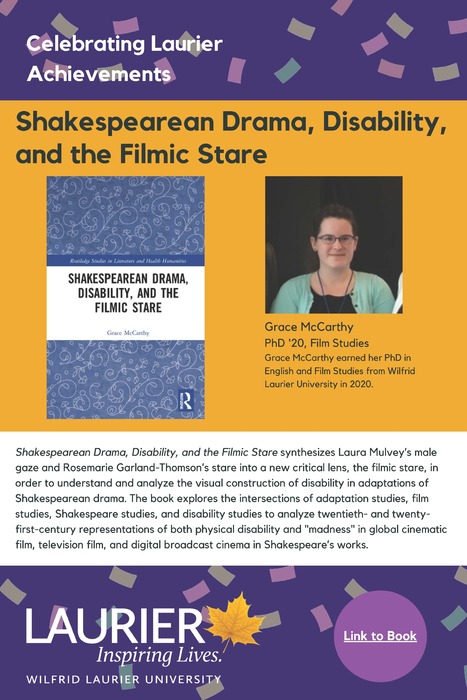 Shakespearean Drama, Disability, and the Filmic Stare
Shakespearean Drama, Disability, and the Filmic Stare Shakespearean Drama, Disability, and the Filmic Stare synthesizes Laura Mulvey’s male gaze and Rosemarie Garland-Thomson’s stare into a new critical lens, the filmic stare, in order to understand and analyze the visual construction of disability in adaptations of Shakespearean drama. The book explores the intersections of adaptation studies, film studies, Shakespeare studies, and disability studies to analyze twentieth- and twenty-first-century representations of both physical disability and "madness" in global cinematic film, television film, and digital broadcast cinema in Shakespeare’s works.
-
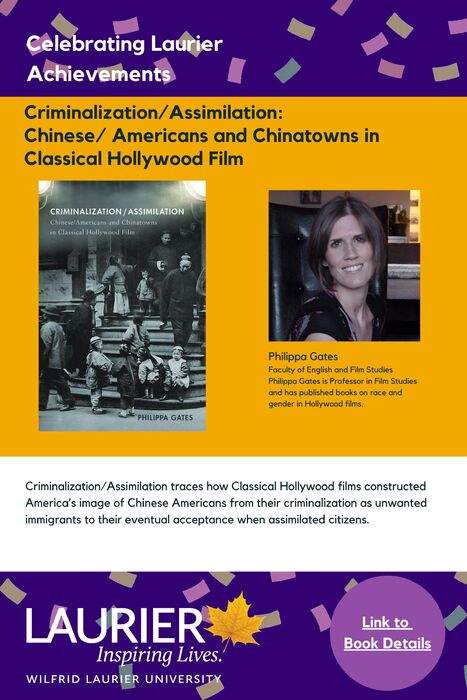 Criminalization/Assimilation: Chinese/Americans and Chinatowns in Classical Hollywood Film
Criminalization/Assimilation: Chinese/Americans and Chinatowns in Classical Hollywood Film Criminalization/Assimilation traces how Classical Hollywood films constructed America’s image of Chinese Americans from their criminalization as unwanted immigrants to their eventual acceptance when assimilated citizens.
-
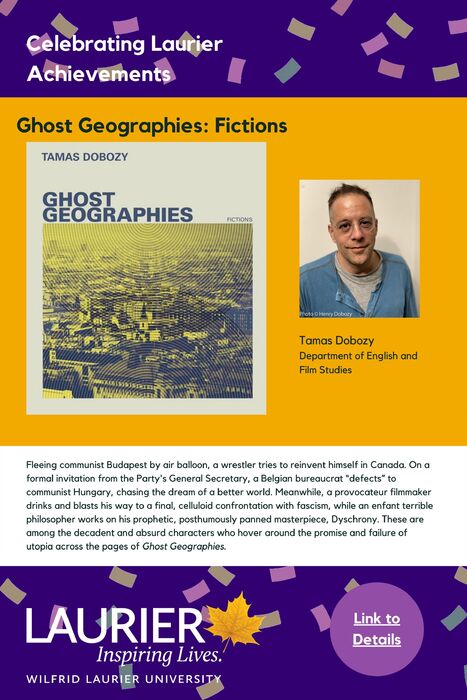 Ghost Geographies: Fictions
Ghost Geographies: Fictions Fleeing communist Budapest by air balloon, a wrestler tries to reinvent himself in Canada. On a formal invitation from the Party's General Secretary, a Belgian bureaucrat “defects” to communist Hungary, chasing the dream of a better world. Meanwhile, a provocateur filmmaker drinks and blasts his way to a final, celluloid confrontation with fascism, while an enfant terrible philosopher works on his prophetic, posthumously panned masterpiece, Dyschrony. These are among the decadent and absurd characters who hover around the promise and failure of utopia across the pages of Ghost Geographies.
-
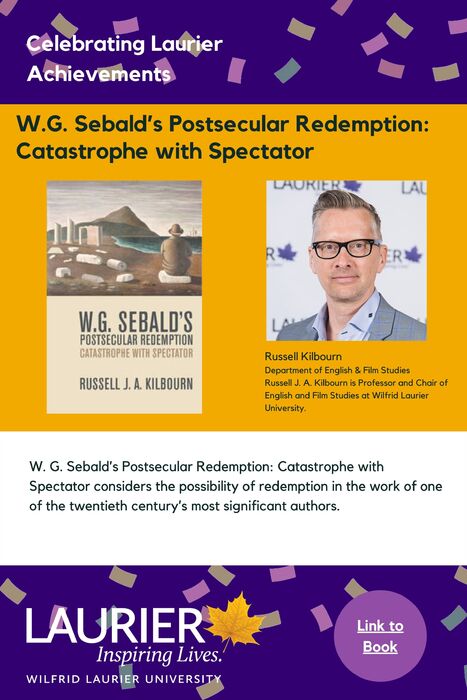 W.G. Sebald’s Postsecular Redemption: Catastrophe with Spectator
W.G. Sebald’s Postsecular Redemption: Catastrophe with Spectator W. G. Sebald’s Postsecular Redemption: Catastrophe with Spectator considers the possibility of redemption in the work of one of the twentieth century’s most significant authors.
 The Changing Face of Iceland The Changing Face of Iceland, Mark Terry’s third film in a trilogy of documentaries examining the impacts of climate change on the polar regions, premiered at COP26 in Glasgow, Scotland on November 4, 2021, presented by The United Nations Framework Convention on Climate Change. Writer, Producer, and Director Dr. Mark Terry presented it to the world leaders, delegates, and press followed by a brief question period.
The Changing Face of Iceland The Changing Face of Iceland, Mark Terry’s third film in a trilogy of documentaries examining the impacts of climate change on the polar regions, premiered at COP26 in Glasgow, Scotland on November 4, 2021, presented by The United Nations Framework Convention on Climate Change. Writer, Producer, and Director Dr. Mark Terry presented it to the world leaders, delegates, and press followed by a brief question period. Shadow Boxing and Other Bizarre Adventures of a Blind Girl When I was thirteen years old, I found out that I was slowly going blind. In 1999, I was diagnosed with a degenerative, genetic eye condition called Retinitis Pigmentosa. This condition will leave me mostly, if not completely, blind. As a teenager who felt I could see fine, going blind felt far away. Now, at age thirty-two, I have lost the majority of my peripheral vision and going blind feels anything but far away. If you are going blind and wonder how in the hell you are supposed to cope with this, my story is for you. If you love someone who is going blind and wish that you knew how to help in some way, my story is for you.
Shadow Boxing and Other Bizarre Adventures of a Blind Girl When I was thirteen years old, I found out that I was slowly going blind. In 1999, I was diagnosed with a degenerative, genetic eye condition called Retinitis Pigmentosa. This condition will leave me mostly, if not completely, blind. As a teenager who felt I could see fine, going blind felt far away. Now, at age thirty-two, I have lost the majority of my peripheral vision and going blind feels anything but far away. If you are going blind and wonder how in the hell you are supposed to cope with this, my story is for you. If you love someone who is going blind and wish that you knew how to help in some way, my story is for you. After the Hatching Oven After the Hatching Oven (poems) explores chickens: their evolution as a domesticated species; their place in history, pop culture and industrial agriculture; their exploitation and their liberation.
After the Hatching Oven After the Hatching Oven (poems) explores chickens: their evolution as a domesticated species; their place in history, pop culture and industrial agriculture; their exploitation and their liberation. Older Sister. Not Necessarily Related Winner of the 2019 Hilary Weston Writers' Trust Prize for Nonfiction A beautiful and haunting memoir of kinship and culture rediscovered. Jenny Heijun Wills was born in Korea and adopted as an infant into a white family in small-town Canada. In her late twenties, she reconnected with her first family and returned to Seoul where she spent four months getting to know other adoptees, as well as her Korean mother, father, siblings, and extended family. Older Sister. Not Necessarily Related. describes in visceral, lyrical prose the painful ripple effects that follow a child's removal from a family, and the rewards that can flow from both struggle and forgiveness.
Older Sister. Not Necessarily Related Winner of the 2019 Hilary Weston Writers' Trust Prize for Nonfiction A beautiful and haunting memoir of kinship and culture rediscovered. Jenny Heijun Wills was born in Korea and adopted as an infant into a white family in small-town Canada. In her late twenties, she reconnected with her first family and returned to Seoul where she spent four months getting to know other adoptees, as well as her Korean mother, father, siblings, and extended family. Older Sister. Not Necessarily Related. describes in visceral, lyrical prose the painful ripple effects that follow a child's removal from a family, and the rewards that can flow from both struggle and forgiveness. Cluster Acclaimed poet Souvankham Thammavongsa returns with her fourth collection, a book about meaning. Meaning can sometimes blow up, crack something we had not seen, or darken what had been seen so clear to us. Meaning can happen with so little and go on to take so much from us. Meaning can sometimes take a long time to arrive, years even, if ever. And it's possible meaning does not mean, and that in itself could be meaningful.
Cluster Acclaimed poet Souvankham Thammavongsa returns with her fourth collection, a book about meaning. Meaning can sometimes blow up, crack something we had not seen, or darken what had been seen so clear to us. Meaning can happen with so little and go on to take so much from us. Meaning can sometimes take a long time to arrive, years even, if ever. And it's possible meaning does not mean, and that in itself could be meaningful. Resetting the Scene: Classical Hollywood Revisited Resetting the Scene: Classical Hollywood Revisited showcases cutting-edge work by renowned researchers and proposes new directions for the study of films produced by American motion picture studios between 1917 and 1960.
Resetting the Scene: Classical Hollywood Revisited Resetting the Scene: Classical Hollywood Revisited showcases cutting-edge work by renowned researchers and proposes new directions for the study of films produced by American motion picture studios between 1917 and 1960. Shakespearean Drama, Disability, and the Filmic Stare Shakespearean Drama, Disability, and the Filmic Stare synthesizes Laura Mulvey’s male gaze and Rosemarie Garland-Thomson’s stare into a new critical lens, the filmic stare, in order to understand and analyze the visual construction of disability in adaptations of Shakespearean drama. The book explores the intersections of adaptation studies, film studies, Shakespeare studies, and disability studies to analyze twentieth- and twenty-first-century representations of both physical disability and "madness" in global cinematic film, television film, and digital broadcast cinema in Shakespeare’s works.
Shakespearean Drama, Disability, and the Filmic Stare Shakespearean Drama, Disability, and the Filmic Stare synthesizes Laura Mulvey’s male gaze and Rosemarie Garland-Thomson’s stare into a new critical lens, the filmic stare, in order to understand and analyze the visual construction of disability in adaptations of Shakespearean drama. The book explores the intersections of adaptation studies, film studies, Shakespeare studies, and disability studies to analyze twentieth- and twenty-first-century representations of both physical disability and "madness" in global cinematic film, television film, and digital broadcast cinema in Shakespeare’s works. Criminalization/Assimilation: Chinese/Americans and Chinatowns in Classical Hollywood Film Criminalization/Assimilation traces how Classical Hollywood films constructed America’s image of Chinese Americans from their criminalization as unwanted immigrants to their eventual acceptance when assimilated citizens.
Criminalization/Assimilation: Chinese/Americans and Chinatowns in Classical Hollywood Film Criminalization/Assimilation traces how Classical Hollywood films constructed America’s image of Chinese Americans from their criminalization as unwanted immigrants to their eventual acceptance when assimilated citizens. Ghost Geographies: Fictions Fleeing communist Budapest by air balloon, a wrestler tries to reinvent himself in Canada. On a formal invitation from the Party's General Secretary, a Belgian bureaucrat “defects” to communist Hungary, chasing the dream of a better world. Meanwhile, a provocateur filmmaker drinks and blasts his way to a final, celluloid confrontation with fascism, while an enfant terrible philosopher works on his prophetic, posthumously panned masterpiece, Dyschrony. These are among the decadent and absurd characters who hover around the promise and failure of utopia across the pages of Ghost Geographies.
Ghost Geographies: Fictions Fleeing communist Budapest by air balloon, a wrestler tries to reinvent himself in Canada. On a formal invitation from the Party's General Secretary, a Belgian bureaucrat “defects” to communist Hungary, chasing the dream of a better world. Meanwhile, a provocateur filmmaker drinks and blasts his way to a final, celluloid confrontation with fascism, while an enfant terrible philosopher works on his prophetic, posthumously panned masterpiece, Dyschrony. These are among the decadent and absurd characters who hover around the promise and failure of utopia across the pages of Ghost Geographies. W.G. Sebald’s Postsecular Redemption: Catastrophe with Spectator W. G. Sebald’s Postsecular Redemption: Catastrophe with Spectator considers the possibility of redemption in the work of one of the twentieth century’s most significant authors.
W.G. Sebald’s Postsecular Redemption: Catastrophe with Spectator W. G. Sebald’s Postsecular Redemption: Catastrophe with Spectator considers the possibility of redemption in the work of one of the twentieth century’s most significant authors.